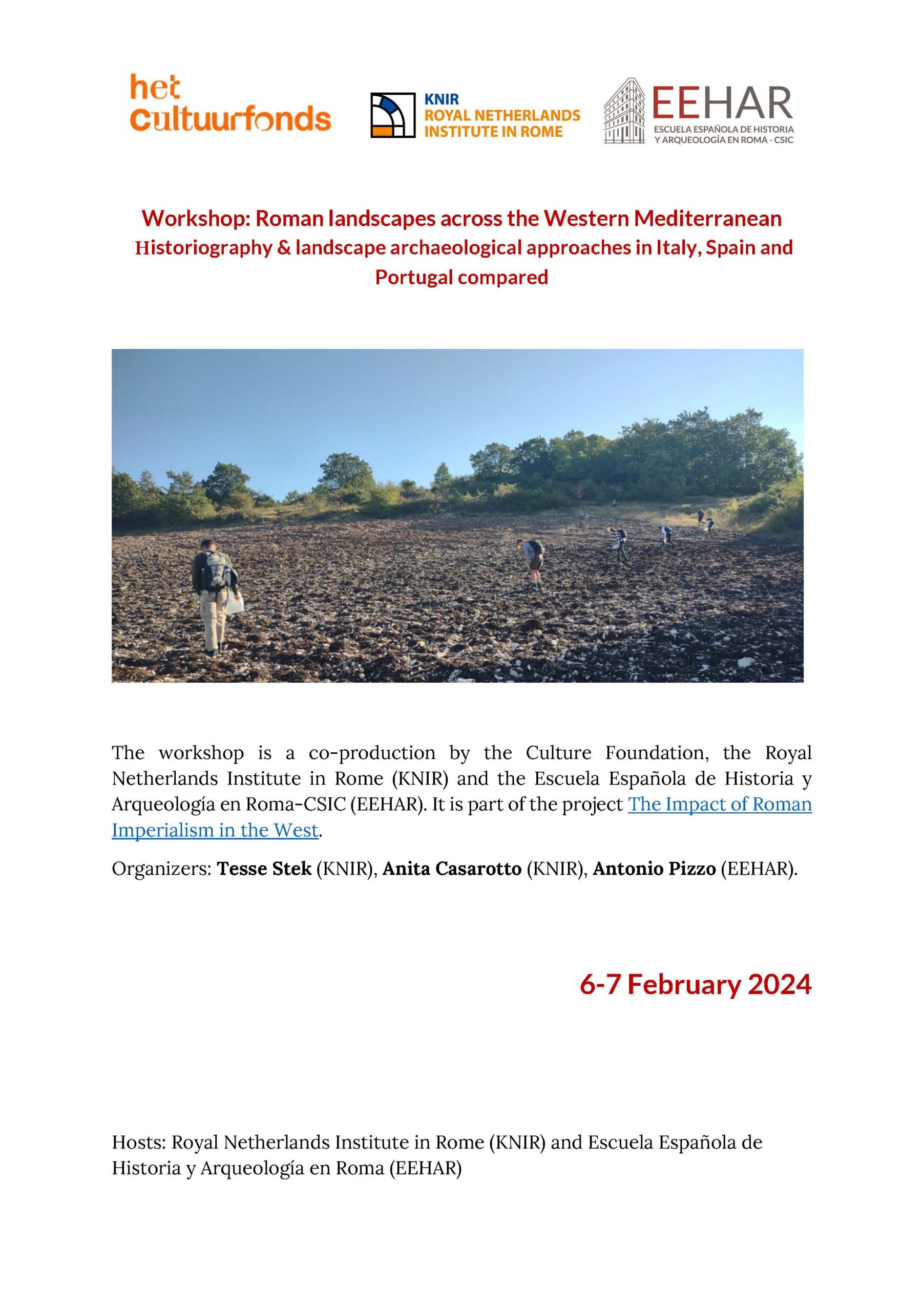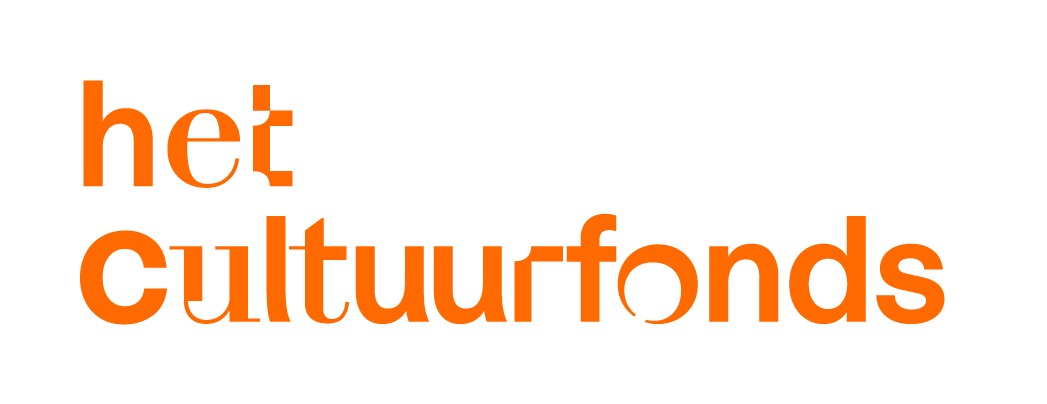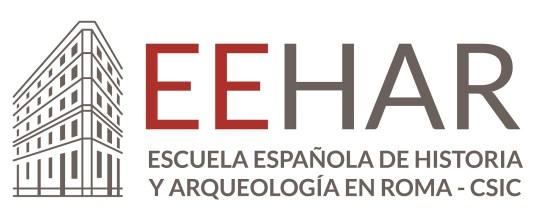Venues:
6 February: KNIR, Via Omero 10, Rome
7 February: EEHAR, Via di Sant’Eufemia 13, Rome
The Western Mediterranean area has a long shared history, of which the Roman period undoubtedly forms a long and incisive phase. With a straightforward geographical and temporal trajectory, in theory the Western Mediterranean offers an ideal observatory for studying the development of Roman imperialism over time. In practice, however, comparative research is hampered by different national research traditions. These operate on different levels: from the more evident ideological and political influences on the writing of national histories, to the practical choices made by archaeologists in the field. In this workshop, we want to explore the backgrounds of the differences in national research traditions in Portugal, Spain and Italy. We do this first by discussing the general histories of studies on the Roman period, and more specifically how the transition between the Iron Age and the early Roman expansion has been viewed. Second, we discuss the differences in methods and data collection of landscape archaeological research in these West-Mediterranean countries. The aim is to get a better understanding of the depth of the gap between different West-Mediterranean datasets, methodologies and historical interpretations, and hence to identify what we need to do before we can work towards a solidly based, transnational perspective on Roman expansionism in the West.
The workshop is a co-production by the Culture Foundation, the Royal Netherlands Institute in Rome (KNIR) and the Escuela Española de Historia y Arqueología en Roma-CSIC (EEHAR). It is part of the project The Impact of Roman Imperialism in the West.
To attend in presence, please register by sending an e-mail to secretary@knir.it. There will be no livestream.
See here for a detailed program
Program
6 February, KNIR Royal Netherlands Institute in Rome (Via Omero 10/12)
10:30 – 11:00 Coffee and Tea
11:00 – 11:15 Introduction. Tesse D. Stek, Anita Casarotto (KNIR, University of Groningen)
Part I. Historiography: different traditions in Roman studies
11:15 – 12:05 The archaeology of the Roman period in Portugal: the role of German scholars. Ana Cristina Martins (IHC-University of Évora/IN2PAST)
12:05 – 12:55 The archaeology of the Roman period in Spain: a history of many faces. Margarita Díaz-Andreu (ICREA, University of Barcelona)
13:00 – 14:00 Lunch break
Part II. Historiography: different traditions in (Roman) landscape archaeology
14:00 – 14:45 Research Schools and field survey in Italy: the basics and some divisions. Alessandro Vanzetti (Sapienza University of Rome)
14:45 – 15:30 Monograph vs Catalogue. La cartografia archeologica nell’esperienza degli studi di Topografia Antica. Alessandro Jaia (Sapienza University of Rome)
15:30 – 16:15 Changing visions of Roman rural life across academic traditions in Spain. A critical approach from the region of Extremadura. Victorino Mayoral (Instituto de Arqueología-Mérida)
16:15 – 16:30 Coffee break
16:30 – 17:15 Research traditions in field archaeology in the West. How to study
Roman cultural landscapes across Spain, Portugal and Algeria. Jesús García Sánchez (Instituto de Arqueología-Mérida)
17:15 – 18:00 The good, the bad and the ugly: ancient data or new problems, the Alentejo case in legacy data, classifications and heritage management. André Carneiro (University of Évora)
18:00 – 19:00 Discussion moderated by Nicola Terrenato (University of Michigan)
7 February, EEHAR Escuela Española de Historia y Arqueología en Roma (Via di S. Eufemia 13)
Part III. Landscape archaeology compared
1. Landscape archaeology across the border
10:30 – 11:00 Il Progetto Ager Lucerinus. Il metodo della Carta Archeologica d’Italia: nuovi approcci ai cambiamenti dei paesaggi. Maria Luisa Marchi (Foggia University)
11:00 – 11:30 Integrating survey data beyond central Italy: experiences and future perspectives from the RHP and Semafora projects. Tymon de Haas (University of Groningen)
11:30 – 12:00 Roman landscapes in the Alcoi Valley, Eastern Iberia. Multiscalar archaeological approach to settlement patterns and dynamics. Ignasi Grau Mira (University of Alicante)
12: 00 – 12:30 Perspectives for the analysis of the rural settlement in Central Portugal during the Late Roman Period and Early Medieval Age. Catarina Tente (NOVA University of Lisbon), Tomas Cordero Ruiz (NOVA University of Lisbon)
12:30 – 13:30 Lunch break
2. Site classification & interpretation between legacy and new field work
13:30 – 14:00 Surveying sites in the surroundings of Regina Turdulorum (pr. Badajoz, Spain): questions of method and definition. Günther Schörner (University of Vienna)
14:00 – 14:30 Arpi: dinamiche ambientali e storiche di un insediamento dauno. Questione di metodi. Alfonso Santoriello (University of Salerno)
14:30 – 15:00 Exploring Roman-period mountain society: village patterns in Apennine Italy and central-northern Portugal. Anita Casarotto (KNIR, University of Groningen), Tesse D. Stek (KNIR, University of Groningen)
15:00 – 15:30 Merging field survey datasets from Sibaritide (Calabria, Italy): rural settlement systems and off-site patterns from the coast to the uplands. Martina Parini (University of Groningen)
15:30 – 16:00 First identify and protect, then classify and interpret. The municipality of Guarda as a case study for Beira Interior. Vìtor Pereira (Museum of Guarda), Tiago Ramos (NOVA University of Lisbon), Daniel Sardinha (University of Groningen)
16:00 – 16:15 Coffee/Tea break
16:15 – 16:45 Round holes, square pegs? Merging stories and databases in the Beyond Ports project. Maria del Carmen Moreno Escobar (Lund University)
16:45 – 17:15 Hillforts in the digital age: analyzing monumentality and inequality at settlement and landscape level in the Alto Minho region (northern Portugal) through GIS and remote sensing. João Fonte (University of Exeter), Fernando Menéndez-Marsh (University of Groningen), Pastor Fábrega Álvarez (Incipit CSIC), César Parcero Oubiña (Incipit CSIC)
17:15 – 17:45 Untangling legacy data. Castros, oppida, ‘romanisation’ and other not very innocent concepts in central-western Iberia. Fernando Menéndez-Marsh (University of Groningen)
17:45 – 18:15 ‘The Allegory of the Cave’ – Lights and shadows in creating narratives through the archaeological record. Mónica Rolo (University of Lisbon)
18:15 – 18:30 Concluding remarks







